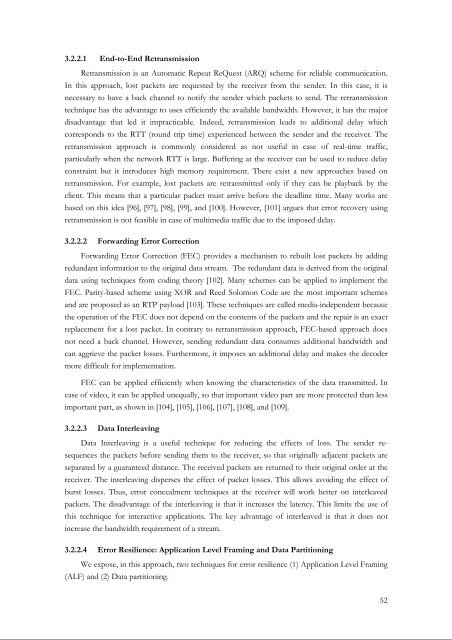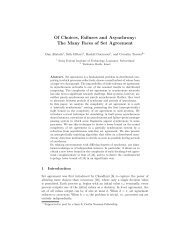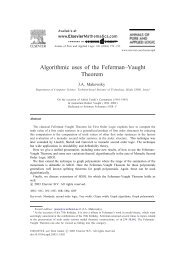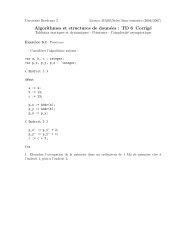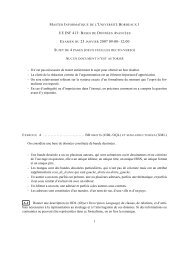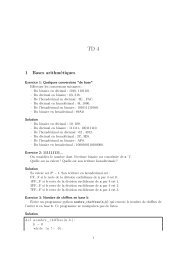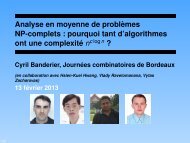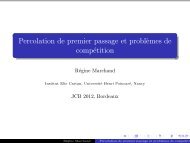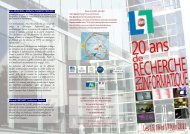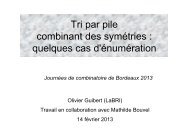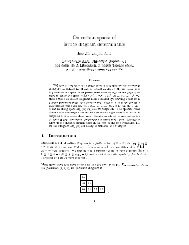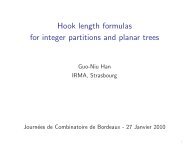TITRE Adaptive Packet Video Streaming Over IP Networks - LaBRI
TITRE Adaptive Packet Video Streaming Over IP Networks - LaBRI
TITRE Adaptive Packet Video Streaming Over IP Networks - LaBRI
Create successful ePaper yourself
Turn your PDF publications into a flip-book with our unique Google optimized e-Paper software.
3.2.2.1 End-to-End Retransmission<br />
Retransmission is an Automatic Repeat ReQuest (ARQ) scheme for reliable communication.<br />
In this approach, lost packets are requested by the receiver from the sender. In this case, it is<br />
necessary to have a back channel to notify the sender which packets to send. The retransmission<br />
technique has the advantage to uses efficiently the available bandwidth. However, it has the major<br />
disadvantage that led it impracticable. Indeed, retransmission leads to additional delay which<br />
corresponds to the RTT (round trip time) experienced between the sender and the receiver. The<br />
retransmission approach is commonly considered as not useful in case of real-time traffic,<br />
particularly when the network RTT is large. Buffering at the receiver can be used to reduce delay<br />
constraint but it introduces high memory requirement. There exist a new approaches based on<br />
retransmission. For example, lost packets are retransmitted only if they can be playback by the<br />
client. This means that a particular packet must arrive before the deadline time. Many works are<br />
based on this idea [96], [97], [98], [99], and [100]. However, [101] argues that error recovery using<br />
retransmission is not feasible in case of multimedia traffic due to the imposed delay.<br />
3.2.2.2 Forwarding Error Correction<br />
Forwarding Error Correction (FEC) provides a mechanism to rebuilt lost packets by adding<br />
redundant information to the original data stream. The redundant data is derived from the original<br />
data using techniques from coding theory [102]. Many schemes can be applied to implement the<br />
FEC. Parity-based scheme using XOR and Reed Solomon Code are the most important schemes<br />
and are proposed as an RTP payload [103]. These techniques are called media-independent because<br />
the operation of the FEC does not depend on the contents of the packets and the repair is an exact<br />
replacement for a lost packet. In contrary to retransmission approach, FEC-based approach does<br />
not need a back channel. However, sending redundant data consumes additional bandwidth and<br />
can aggrieve the packet losses. Furthermore, it imposes an additional delay and makes the decoder<br />
more difficult for implementation.<br />
FEC can be applied efficiently when knowing the characteristics of the data transmitted. In<br />
case of video, it can be applied unequally, so that important video part are more protected than less<br />
important part, as shown in [104], [105], [106], [107], [108], and [109].<br />
3.2.2.3 Data Interleaving<br />
Data Interleaving is a useful technique for reducing the effects of loss. The sender resequences<br />
the packets before sending them to the receiver, so that originally adjacent packets are<br />
separated by a guaranteed distance. The received packets are returned to their original order at the<br />
receiver. The interleaving disperses the effect of packet losses. This allows avoiding the effect of<br />
burst losses. Thus, error concealment techniques at the receiver will work better on interleaved<br />
packets. The disadvantage of the interleaving is that it increases the latency. This limits the use of<br />
this technique for interactive applications. The key advantage of interleaved is that it does not<br />
increase the bandwidth requirement of a stream.<br />
3.2.2.4 Error Resilience: Application Level Framing and Data Partitioning<br />
We expose, in this approach, two techniques for error resilience (1) Application Level Framing<br />
(ALF) and (2) Data partitioning.<br />
52


